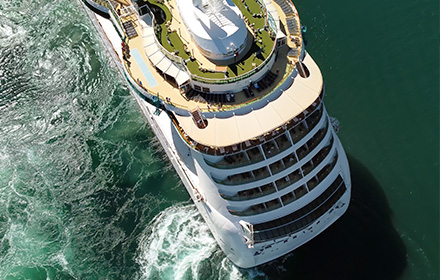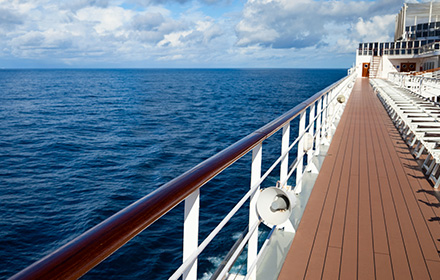What Laws Apply In International Waters?
May 06, 2025
When people hear the phrase "international waters," they often imagine a lawless expanse of ocean where anything goes. Movies and TV shows have reinforced the myth that once you're beyond a country's borders, legal restrictions vanish. But in reality, international waters are not a legal free-for-all. There are complex layers of jurisdiction that determine what laws apply and who has authority—especially in cases involving crimes or legal disputes.

At Donet, McMillan & Trontz, P.A., we often receive questions about crimes committed at sea regarding incidents aboard cruise ships, yachts, or commercial vessels. So let's break it down: What laws apply in international waters—and how could they affect you?
Understanding "International Waters"
International waters, also known as the high seas, begin 12 nautical miles from the baseline of a coastal nation. Beyond that point, no single country has sovereignty. However, this doesn't mean there's no law.
Instead, different international treaties, conventions, and flag state laws determine what happens on the high seas. The most influential is the United Nations Convention on the Law of the Sea (UNCLOS), which governs everything from fishing rights to navigation, environmental protection, and jurisdiction over ships.
1. Flag State Jurisdiction: The Country Where the Vessel Is Registered
The most important factor in determining legal authority in international waters is the flag state—the country under which a vessel is registered.
For example, if a cruise ship is registered in The Bahamas, then Bahamian law governs the ship, even when it's in international waters. This rule applies to:
- Cruise ships
- Cargo vessels
- Private yachts
- Fishing boats
If a crime takes place on board—such as assault, theft, or even murder—the flag state typically has jurisdiction to prosecute the offense, especially if the ship is outside the territorial waters of any nation.

2. U.S. Law Can Still Apply in Many Situations
Even in international waters, U.S. federal law can apply under specific conditions:
- The suspect or victim is a U.S. citizen.
- The ship departs from or arrives at a U.S. port.
- The offense violates federal statutes with extraterritorial reach (e.g., drug trafficking, piracy, child exploitation, possession or transportation of child pornography).
For instance, under the Sexual Offenses Against Children Act, U.S. citizens can be prosecuted in federal court for engaging in illegal sexual conduct with a minor abroad—even if the crime occurred in international waters.
At Donet, McMillan & Trontz, P.A., we've represented clients facing federal criminal charges stemming from incidents at sea, including those charged under statutes that allow for extraterritorial jurisdiction.
3. Piracy and Universal Jurisdiction
Piracy is one of the rare crimes that can be prosecuted by any country, regardless of the nationality of the offender or the victims. This is known as universal jurisdiction.
If a person commits an act of piracy—defined under international law as robbery, violence, or detention committed at sea—they can be arrested and tried by any country's legal system.
4. Port State Jurisdiction
Even though international waters extend beyond 12 nautical miles, once a vessel enters a country's port, that country's laws apply in full.
Let's say a ship sails from Miami and docks in Jamaica. While in Jamaican territorial waters and ports, Jamaican law governs what happens on board. If a crime is committed, local authorities have the right to investigate and arrest suspects.

This often comes into play with offenses like:
- Drug possession or drug trafficking
- Possession of child pornography and transportation of child pornography.
- Theft or fraud.
- Sexual assault or battery.
- Immigration violations.
Foreign jurisdictions can be strict, and legal systems vary significantly from the U.S. If you're facing legal trouble abroad, having an experienced U.S.-based criminal defense attorney—like those at Donet, McMillan & Trontz, P.A.—can be critical to navigating the international legal maze.
5. Private Vessel Conduct in International Waters
If you're aboard a private yacht in international waters, you're still subject to the laws of the flag state. This applies to:
- Drug use or trafficking.
- Illegal gambling.
- Weapons and firearms possession.
- Environmental violations (like illegal dumping).
Some individuals mistakenly believe they can avoid prosecution for illegal activity simply by sailing far enough offshore. However, federal law enforcement agencies like the U.S. Coast Guard have the authority to stop and board vessels suspected of criminal activity—especially if they plan to re-enter U.S. waters.
Legal Trouble at Sea? Here's How DMT Can Help
Criminal cases involving international waters are often complex. Jurisdictional questions can delay investigations or lead to conflicts between legal systems. Whether you're accused of a crime, detained while at sea, or under investigation after disembarking, you need attorneys who understand how to work across jurisdictions and navigate federal and international legal systems.

At Donet, McMillan & Trontz, P.A., we've successfully defended clients in high-stakes cases involving:
- International drug trafficking.
- Sexual misconduct on cruise ships.
- Cybercrime committed offshore.
- Financial crimes with international components.
- Allegations investigated by the FBI, DEA, or Coast Guard.
We offer strategic, aggressive defense built on decades of trial experience and a deep understanding of maritime and federal law.
Final Thoughts
Although it might seem like the ocean is a lawless frontier, the truth is far more structured. Whether you're on a commercial vessel, cruise ship, or private yacht, laws absolutely apply in international waters—and violating them can carry serious consequences.
If you're facing allegations tied to incidents at sea or on foreign-registered vessels, contact Donet, McMillan & Trontz, P.A. today. Our legal team can help you understand your rights, explore your options, and build a strong defense.
Call us now at
(305) 444-0030 or visit our website to schedule a confidential consultation.





















